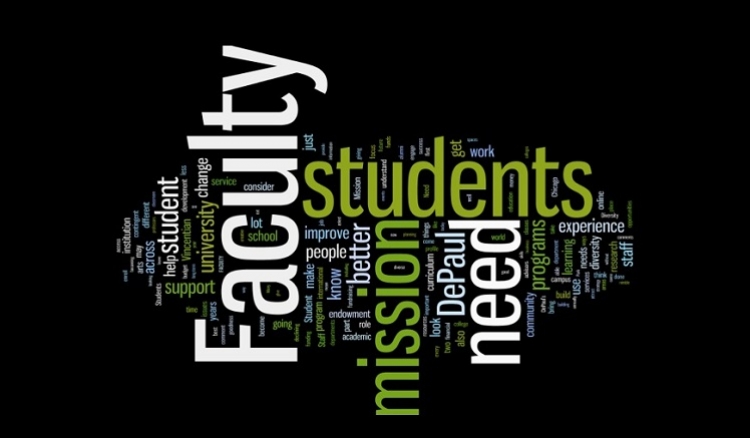 James T. Ryan, chair of DePaul's Board of Trustees, says the university's mission is what differentiates it and should drive the next strategic plan.
James T. Ryan, chair of DePaul's Board of Trustees, says the university's mission is what differentiates it and should drive the next strategic plan.
Board of Trustees chair James T. Ryan visited the Jan. 10 Faculty Council meeting to discuss the board's role in university governance and provided his thoughts on the strategic planning process underway.
He noted it is the board's responsibility to ensure the long-term viability of the university and its mission. Acting as fiduciaries, the board also sets strategy by outlining broad guidelines and strategic priorities, tasking leadership to determine how to best achieve them.
Citing the increasingly competitive environment in higher education, Ryan believes the institutions that are going to be successful need to distinguish themselves. For DePaul, Ryan stressed, our mission is what differentiates us, and the board is fully committed to the long-term viability and vitality of the mission.
This resonates with the Strategic Planning Task Force, which is working hard to deliver an initial draft plan for the university trustees to review at their March 1 meeting.
Jay Braatz, vice president for planning and presidential administration and chair of the task force, says emphatically, "Mission is key to our strength. Our strategies will not only be consistent with our mission, but derived from it."
The task force has been meeting weekly throughout January. It is deep in the process of prioritizing, combining, and narrowing ideas that ascended through town hall meetings and the rich materials provided by the four planning teams. The challenge is to identify and prioritize the most important strategic ideas for the new plan.
Launching new cutting-edge programs is clearly part of the list. Ryan says trustees encourage creation of high-quality academic programs, which he called the lifeblood of DePaul's future.
Today, students and families are less willing to take on debt and are asking questions about the value of higher education. Consequently, DePaul needs to accentuate educational outcomes. Students and their parents want to understand how a DePaul education will help them become employed and, more importantly, be successful throughout their careers. It is incumbent on the university to communicate the value of a broad education, particularly our ability to develop students' critical thinking, diversify their perspectives and ensure they are lifelong learners, according to Braatz.
DePaul also needs to ensure its long-term sustainability, which is why trustees want to double the size of the endowment and reduce reliance on tuition revenue.
"We are planning from a strong position, but we can't rest or become complacent," Ryan said.
Therefore, the most important charge from the board is to come forward with bold new ideas. As Ryan noted, "Don't let the timeline force incremental thinking."
Braatz says the next plan needs to speak to the conditions that exist today and identify the new ideas that will build our long-term sustainability and strength.
"It will be a plan that changes the way we do business, not the business we do," Braatz says. "We need to adapt to contemporary economic conditions now so we can sustain our strength long into the future."